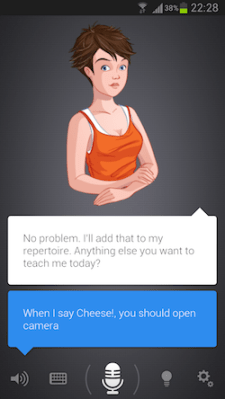Speaktoit Assistant, a Siri alternative that also competes with a host of other AI and natural language-driven ‘personal assistants’, such as Maluuba, is rolling out a premium version of its mobile app to let users teach it new commands. Debuting first on Android and costing $2 per month or $20 per year (which, frankly, seems slightly on the high side) it enables the way you interact with Speaktoit to be customized, essentially changing the expected input and resulting output when speaking to the app.
So, for example, you could teach your phone to pull up its camera when you say the word “cheese”, read the news when you say “what’s the latest?” or search Google Maps when you say “where is the nearest gas station?” — three examples cited by the Intel Capital-backed startup.
The idea, says Speaktoit, is to put the personal back into personal assistant. And it’s certainly true that the ability to change the strings that Speaktoit understands does add a certain charm to the concept, although I’m still inclined to think that the jury is out on whether these types of apps come anywhere close to delivering on their promise of saving time and making tasks easier to complete or if they just make for a good demo of what the future may look like, eventually.
Available on iOS, Android and Windows Phone, Speaktoit claims 6 million users to date. Like its competitors, the app attempts to understand questions and voice commands using natural language processing to perform various tasks, such as setting a calendar reminder, composing a text message or email, updating Twitter or Facebook, opening an app or website, searching for directions, and so on. As with similar apps, how well this works in practice falls down primarily on two things: how good Speaktoit is at understanding the words you use and your accent or pronunciation, and its database of known commands and the functionality this ties into — it’s the ability to change the list of ‘trigger’ phrases and how Speaktoit responds that today’s premium update introduces.
In my tests, I had varied success, the app routinely took my ‘no’ to mean ‘note’, kindly offering to interact with Evernote, although I was able to update my status on Twitter, which was fun, and open various apps and websites or have news headlines read to me. And, like Siri and Maluuba (and Google’s Now), half the battle is simply learning the scope of what functionality is supported and if it wouldn’t actually be quicker just to dump the virtual assistant altogether and perform a task manually. Your mileage may vary.
Cool demo or truly useful
Willing to entertain the idea that it’s not virtual assistants that are the problem, it’s me, I turned to my Twitter followers for use-cases where people actually reach for the likes of Siri, Maluuba, and Speaktoit instead of doing things the old-fashioned way.
And while this was a far from scientific poll, the common response seems to be that these apps are most useful when hands-free operation is required. Texting while driving was one example frequently cited. Or looking up directions while cycling. Or setting a timer while getting messy in the kitchen. In other words, it’s voice operation that’s the pull. Remove this from the equation and the efficiency of a virtual assistant has some way to go yet.
